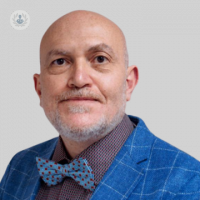Breast cancer detection: how to self-check at home
Written by:Although success rates for treatment of breast cancer have progressed positively in recent years, early detection remains vital in increasing survival rates. For both men and women, maintaining a regular self-checking routine at home allows you to get to know what is normal for you as well as monitoring any changes that may occur in your breasts. Highly respected consultant breast surgeon, Mr Mohsen El Gammal, states that performing regular checks on your breasts at home is a "no-cost tool" that saves the lives of men and women of all ages. In this article, the highly experienced consultant gives expert advice on examining your breasts and explains when you should seek medical attention.

How can I check my breasts at home?
As a first step, Mr El Gammal advises performing a visual exam in front of the mirror. He recommends: "Start by standing with your shoulders straight and your arms on your hips and look at your breasts in the mirror."
You should take note of any of the following:
- any differences in the size, shape or colour of your breasts
- any unusual swelling, distortion or unevenness in the shape of your breasts
- any bulges, dimples or puckering of the skin on the breasts
- any changes in the position of the nipple, including if it has become inverted rather than sticking outwards
- any rashes or redness on the skin
- any soreness or swelling
He continues:
"Still looking in the mirror, check for any signs of fluid coming out of one or both nipples (this might be a watery, milky, or yellow fluid or blood). Next, look to see if the same changes occur when you raise your arms."
Moving on to the touch element of the self-check, Mr El Gammal recommends examining your breast tissue during or after a shower or bath as the skin will be wet and slippery making it easier to perform. While conducting the self-check, he states:
"It’s important to use a firm, smooth touch, keep your fingers flat and together in a circular motion, and you should cover the entire breast from top to bottom, side to side."
He recommends the following:
- first, use your right hand to feel your left breast and then vice-versa, to check both breasts fully whilst lying down
- lastly, to repeat the touch examination while sitting or standing up
When should I see a doctor?
It is important that you see a doctor for further assessment if you notice any of the following:
- a lump with one side that has newly appeared in one of your breasts
- any discharge from the nipple
- a swelling in one breast
- pain in the breast area
A doctor will be able to advise you if further tests are required.
At what age are you most likely to develop breast cancer?
It is important to remember that women and men of any age can develop breast cancer. Mammogram screenings are routine for women over 50 but those who do not fall into this category should take steps to monitor their breasts regularly. As Mr El Gammal states:
“ Breast self-exam is extremely important as it not only helps you to get to know your body and what is normal for you, but it can also help to detect any changes that you should speak to your doctor about… A good tip is to make sure you have a routine. By examining your breasts on a regular basis, you will learn more about them and it will become easier for you to tell if something has changed. ”
Is there any way to prevent breast cancer?
In some cases, unfortunately there is no way to prevent breast cancer. A family history of breast cancer can be related to carrying the BRCA mutation gene which means that the disease is passed down genetically. In other cases however, having awareness of higher risk factors related to breast cancer, such as having high breast density as well as women having periods before the age of 12, can empower people to take an active role in monitoring their breast health throughout their life.
General advice to reduce the risk of non-genetic breast cancer relates to maintaining a healthy diet and limiting alcohol consumption. Additionally, women using oral contraceptives may have a higher risk factor, so reducing their use, if possible, lowers the likelihood of developing breast cancer.
If you are worried about a family history of breast cancer or would like more information, you can reserve a consultation with Mr El Gammal by visiting his Top Doctors profile.


